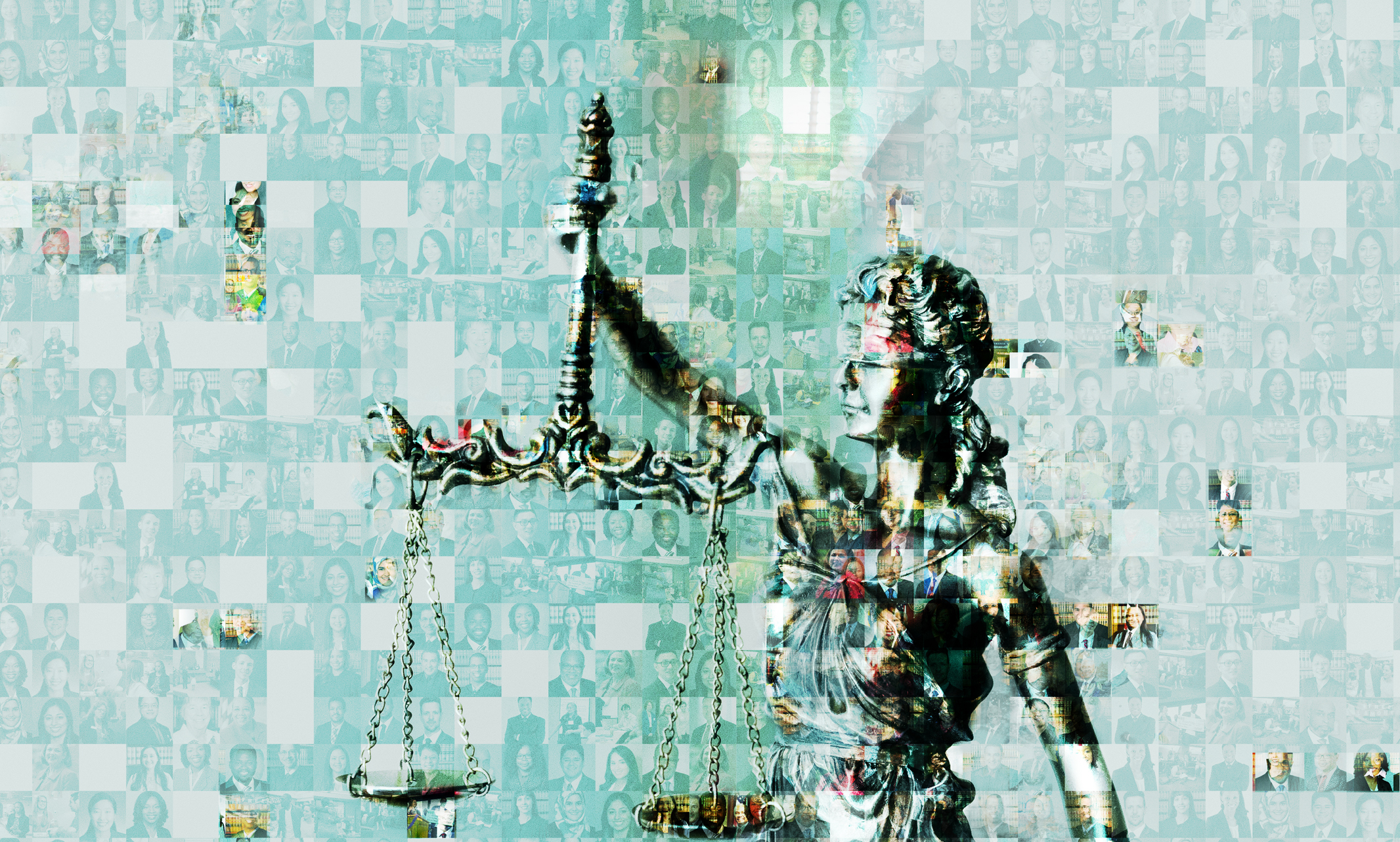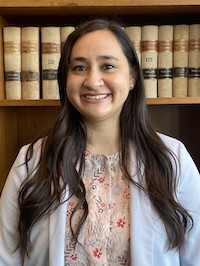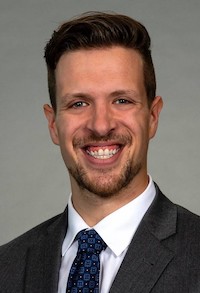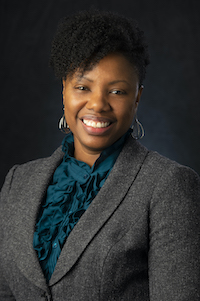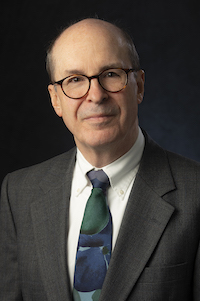This story originally appeared in Res Ipsa, the UMKC School of Law alumni magazine. To learn more, read the full issue or visit the School of Law website.
The police killing of George Floyd in May 2020 shocked the nation and reignited the call to end the systemic racism that has permeated our country for decades. It also renewed conversations among attorneys — for whom upholding justice isn’t simply a goal, but a sworn oath — about what important lessons the law community can learn from the Black Lives Matter movement.
We sat in on one such conversation between three UMKC School of Law graduates who have all gone on to fight systemic racism in their own ways. They covered a vast array of topics — far too many to include here — but with a common thread: No matter where your law career has taken you, there is always work to be done to fight racial injustice. Often, attorneys are uniquely positioned to lead the way.
Meet the alumni
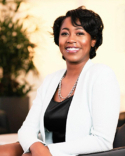
Adrienne B. Haynes (J.D. ’13)
Adrienne B. Haynes is the managing partner of SEED Law, a boutique business law firm, and owner of SEED Collective, a consultancy. She is also the founder and president of the Multicultural Business Coalition and president of the Black Female Attorneys Network. Haynes has been honored by the Kansas City Business Journal, Kauffman Foundation, Forbes 30 Under 30, and Greater Kansas City Chamber of Commerce for her entrepreneurship and advocacy work.
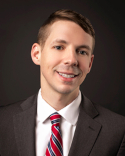
Kendall Seal (J.D. ’08)
Kendall Seal is director of advocacy for the ACLU of Kansas and an adjunct professor at the UMKC School of Law. He previously served as Vice President and General Counsel for the Women’s Foundation and a lawyer for Legal Aid of Western Missouri. Following civil unrest in Ferguson, Missouri, Seal served on the U.S. Commission on Civil Rights – State Advisory Committee, which investigated the intersection of civil rights concerns and law enforcement practices over two years. He specializes in domestic violence and human trafficking law.
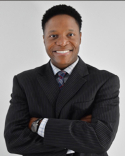
Shaun Stallworth (J.D. ’08)
Shaun Stallworth is a civil rights attorney with Holman Schiavone, LLC. He recently completed a two-year term as president of the Jackson County Bar Association, one of the oldest associations in the region for Black attorneys. He has also worked with Freedom, Incorporated, a political organization that advocates for African Americans, and serves on the Kansas City Police Accountability Task Force. He has represented Black Lives Matters protesters pro bono, and recently joined a project by UMKC Dean Emerita Ellen Y. Suni to help people clear their criminal records in order to find employment.
On why racial justice should matter to all attorneys
Shaun Stallworth: We have to decide, what type of country do we want to be? Are we going to be an eyes-wide-open country, or are we going to close our eyes and act like if we just wish it, it will improve? We have to take proactive steps to make sure it’s happening.
Adrienne B. Haynes: For me, as I grow, I’ve been working to really train that muscle of what it means to be a systems thinker, because I don’t think it’s just assumed or normal. For me, there are these three core competencies that help me understand what systems thinking means and how I can keep this perspective in my work: the ability to see the larger system, the capacity to foster reflection and conversation, and then, ultimately, the ability to shift from reactive problem solving to co-creation of the future. I think if you start with those, it allows us to look at the issue with a more proactive perspective and pull some action items out of that.
Kendall Seal: Law schools — and higher education in general — really need to dedicate themselves to eradicating white supremacy in our society. I don’t think it’s enough to say we’re working toward justice. Law students have to be ready to meet the moment, and we’re doing them a disservice if we’re not making these conversations fundamental to their studies. And white folks need to listen more. They need to learn when to step back and when to step up.
“One of the things I’m reminded of is the state motto of Missouri, which says, ‘let the welfare of the people be the supreme law.’ Conversations about racial justice and equity and fairness go hand in hand with that.”
On the art of listening and unlearning
ABH: Kendall, because this is going in a law school magazine, I think we should talk about that. How do you think law schools can even address that? Is it a class? Because I did notice in law school I came in wanting to be a public servant, but sometimes law school can become less about the people and get away from the real heart of the work.
KS: One of the best classes I had in law school was actually on listening. As lawyers, so much of the job is having the answer and trying to know everything. Maybe we can find ways in our legal education to help students and practitioners be more comfortable not “knowing everything” and creating opportunities for conversation and exploration. Whether that is experiential learning or in the classroom, we should be incredibly intentional. You should not graduate law school without tackling issues of systemic racism in the legal system and society.
ABH: You’re right, for there to be real change, it’s not a class — an elective makes it feel optional, so you’re right, it needs to be entrenched into the system.
SS: When Kendall and I started law school in 2005, there were roughly 200 people in our first-year class and only four Black people. When I was in Constitutional Law and we talked about Plessy v. Ferguson and separate but equal, people would ask me, “Well how do you feel about that?” And there’s this thought that Black folks are supposed to act as the monolith for all things Black because you’re the only Black person in the room. That is a difficult situation for a lot of people of color, whether you’re in the classroom, the boardroom, the office, the neighborhood meeting. I tie that back to the listening aspect that Kendall mentioned. Listening can go a long way — listening to why a person of color might feel out of place.
ABH: Things like listening and failure, those soft skills, we don’t necessarily learn or talk about them directly in law school. In my own practice, there’s an expectation that I have the answers. And in our consultations we let people know — just training people away from that.
KS: To change we have to unlearn and do things differently. We have to be honest, and I don’t know that as a profession we’re always completely honest about our shortcomings and where we have work to do.
“In our role as attorneys, you have an obligation to be a change-maker, even if you’re working in a corporate setting. You can still make a difference and assist people.”
On fighting systemic racism from every seat
ABH: No matter what practice area you work in, we all have to be self-reflective. If a year into the pandemic you’re an attorney wondering, “how do I help?”, you don’t have the right friends around you. ... Life is short, and we’ve got to use our time well, especially those of us who have a privilege like a law degree. Law school doesn’t necessarily make you a lawyer, it teaches you how to think — you’ll hear that all the time. As attorneys, to not see what’s going on in the world is to purposely not see it.
SS: Adrienne said a word that stood out to me: self-reflective. … What we have to do is acknowledge that people don’t always know racism when they see it. We have to be prepared to step up and say, “Could I be biased in this situation? I don’t mean to, I’m not a racist, but could I have an implicit bias I didn’t realize that I have?” It’s easy to point out when someone says the n-word, “oh that’s terrible, oh my gosh!” Right? That’s obvious. The difficult part is on the base level to be self-reflective and acknowledge, “it might be me.”
KS: White folks who are silent are complicit in this problem. That needs to be really clear, from my perspective. If you’re doing nothing, then you’re part of the problem.
ABH: We know these things take courage and unlearning. I’m in a Facebook group with women who run practices all over the world, and last week someone posted, “Oh my god, I’m sitting in court and the judge just discriminated against my client!” And she sits there, complicitly, and posts about it in the group afterward. If you feel something’s not quite right, you have to say something. And it does take courage.
SS: Kendall talked about people being silent. There was an uncomfortable situation in court just the other year, and there was another attorney in the courtroom who followed me out and said, “Man, that was terrible.” And it made me think, yeah, you’re saying it to me, but would you say something to the judge? Because as awkward as you would feel saying something to him, imagine how awkward I felt being up there having it said to me.
ABH: It reiterates for me the importance of black judges and diverse team members in all posts of the court, because otherwise you don’t have that advocacy.
SS: You don’t have to be saying the n-word or some derogatory term to have a bias in what you’re doing, even if you don’t realize it. And we should have a conversation about that. Food for thought.
KS: It’s empathy. People laugh at it sometimes, but I think we have to teach empathy. It has to be fundamental to what we’re doing, too. The appointments to the bench — that’s also a place of hope. The law can change, and lawyers can be part of the solution. It can be positive and it can be a better story.
“We gave this oath to support the Constitution and to practice law, ‘with consideration for the defenseless and oppressed.’ Sometimes we gloss over those words. But with the expensive paper comes a duty. I hope we do right by it and one another.”
Closing thoughts
ABH: I just would remind people to stay connected to the law school and those students. The things that they’re unlearning — let’s try to lovingly teach them that and be examples. Let’s change the perception of an attorney from the shark on TV to someone who’s more compassionate, a community member, someone who’s really self-aware and reflective — the best of us.
SS: In our role as attorneys, you have an obligation to be a change-maker, even if you’re working in a corporate setting. Even if you’re working at one of the largest law firms. You can still make a difference and assist people. Adrienne talked about that oath we took when we first became attorneys — remember that. Get involved, stay involved, and spend some of your time to try and assist others.
KS: We gave this oath to support the Constitution and to practice law, “with consideration for the defenseless and oppressed.” Sometimes we gloss over those words. We got sworn in, we took the picture, and we’ve got expensive paper on our wall. But with the expensive paper comes a duty. I hope we do right by it and one another.

